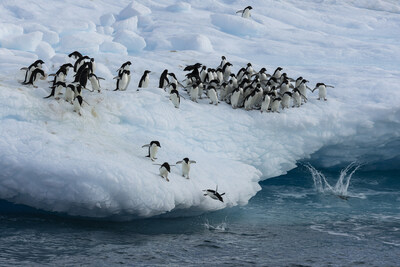|
23.06.2023 23:24:00
|
International Meeting on Antarctic Ocean Protection Ends With No Further Progress
Two countries thwart the will of the remaining twenty-five to create a system of marine protected areas
SANTIAGO, Chile, June 23, 2023 /PRNewswire/ -- Members of the Commission for the Conservation of Antarctic Marine Living Resources (CCAMLR) were unable to reach consensus on the designation of marine protected areas (MPAs) at a special meeting in Santiago, Chile, called to address a six-year stalemate of forward progress. The last MPA designated by the Commission was in 2016, when members agreed to the largest protected area in the world in the Ross Sea.
"Scientific studies point to an increasingly urgent need to protect the Southern Ocean. Unfortunately, this special meeting ended as the previous six annual meetings have: with two countries blocking the will of the other 25 CCAMLR members to make progress toward a network of Southern Ocean MPAs," said Andrea Kavanagh, who directs Antarctic and Southern Ocean work for the Pew Bertarelli Ocean Legacy project. "Those 25 members repeatedly work to deliver on CCAMLR's mandate to conserve Antarctic marine life, using a precautionary approach and the best available science. The other two repeatedly derail the process by demanding more data to protect the ocean than to exploit it."
"CCAMLR is a convention founded to conserve marine life–its mission is in its very name. Yet in the last two years, while the body has successfully passed 66 measures allowing fishing in the region to continue as usual, no new measures related to the conservation of marine ecosystems have been adopted," said Claire Christian, executive director of the Antarctic and Southern Ocean Coalition.
There were high hopes that CCAMLR would use the occasion to take a step toward protecting 30% of the global ocean by 2030—part of the "30 by 30" target that the 196 parties to the Convention on Biological Diversity agreed to in Montreal last December. World leaders reaffirmed that 30 by 30 commitment again this week, in New York, when they adopted a United Nations treaty to protect the high seas. The majority of Members came to Santiago prepared with solutions, but it was clear that not all came with the political will to negotiate in good faith.
"The Commission's system of consensus decision making is fundamentally broken. But decisions under the Global Ocean Treaty, which was adopted this week at the United Nations, allows voting on decisions," said Chris Thorne of Greenpeace's Protect the Oceans campaign. "This gives us hope, but something must change for the Commission to fulfill its responsibility of protecting the Antarctic Ocean."
"The Commission for the Conservation of Antarctic Marine Living Resources (CCAMLR) plays the most important role in protecting the Southern Ocean. For over eleven years, it has failed to achieve its goal of establishing a representative network of marine protected areas", said Sascha Mueller-Kraenner, Executive Director at Deutsche Umwelthilfe (DUH). "We urgently need engagement at the highest political level in upcoming CCAMLR meetings to move forward on designating the existing proposals of three marine protected areas."
While the Santiago gathering was only the third special meeting in the Commission's history, efforts to move MPA designations forward require further focused, high-level discussions between countries.
"This special CCAMLR meeting was a concrete opportunity to make progress to protect ocean life in Antarctica," said Emily Grilly, Antarctic Conservation Manager for WWF. "Leaders squandered another chance to take action and must now step up during the annual meeting in October, or continue to risk the health of the Southern Ocean and its biodiversity."
CCAMLR: The Commission for the Conservation of Antarctic Living Resources (CCAMLR) was established under the Antarctic Treaty System to preserve the biodiversity of the Southern Ocean. CCAMLR is a consensus-based organization consisting of 27 Members, including the EU and eight of its Member States. CCAMLR's mandate includes fisheries management based on the ecosystem approach, the protection of Antarctic nature and the creation of vast marine protected areas allowing the ocean to increase the resilience to climate change. In 2009, CCAMLR member countries began to undertake their responsibilities to establish a network of MPAs throughout the Southern Ocean and established the first high seas MPA on the southern shelf of the South Orkney Islands. In 2016 the world's largest MPA was agreed in the Ross Sea (proposed by the United States & New Zealand; 2.02 million km2).
Currently, there are three proposals for the creation of new MPAs in the Southern Ocean. Two proposed by the EU and its member states, together with Australia, Norway, Uruguay, the United States, the United Kingdom, New Zealand, India, South Korea and Ukraine: East Antarctic with 0.95 million km2, the Weddell Sea – 2.18 million km2; The Antarctic Peninsula: from Argentina and Chile- about 0.65 million km2.
The protection of these three large areas would safeguard nearly 4 million km2 of Antarctica's ocean. That is roughly the size of the EU and represents 1% of the global ocean. Together this would secure the largest act of ocean protection in history.
![]() View original content to download multimedia:https://www.prnewswire.com/news-releases/international-meeting-on-antarctic-ocean-protection-ends-with-no-further-progress-301861323.html
View original content to download multimedia:https://www.prnewswire.com/news-releases/international-meeting-on-antarctic-ocean-protection-ends-with-no-further-progress-301861323.html
SOURCE Antarctic and Southern Ocean Coalition
 Der finanzen.at Ratgeber für Aktien!
Der finanzen.at Ratgeber für Aktien!
Wenn Sie mehr über das Thema Aktien erfahren wollen, finden Sie in unserem Ratgeber viele interessante Artikel dazu!
Jetzt informieren!

